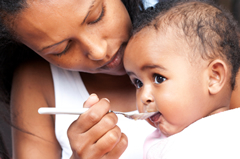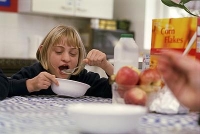The Social Context of Food course


As healthcare practitioners we often feel we know what infants and young children should be eating, but the families we work with can experience barriers in putting this information into practice. In our day-to-day practice, we need to consider the social aspects of food and the effect that our environment has on our food choices.
This session was reviewed by Amanda Avery and updated in February 2017.
Learning Objectives
By the end of this session you will be able to:
- Describe the variability in how families organise eating according to religious, cultural and socio-economic circumstances
- List the external influences on families’ food choices
- Describe the benefits of family mealtimes and parental role modelling
To improve nutritional intakes of families and communities, healthcare practitioners (HCPs) need to help families change their eating habits. To do this, HCPs require an understanding of why and how families make their food choices and engage in particular feeding practices.
Lisa worked as a Paediatric Dietitian for Calderdale and Huddersfield NHS Trust in West Yorkshire for nine years before starting as a freelance Peadiatric Dietitian after moving back to Aberdeenshire in early 2008.
Her special interests are obesity, feeding problems and poor growth.

- End of Life Care | Specialist care | Tracheostomy ...
- Posted By eIntegrity Healthcare e-Learning
- Posted Date: 2025-01-10
- Location:Online
- This session covers basic knowledge required to keep patients safe if they have a tracheostomy and laryngectomy, including:<br><br>• Humidification<br>• Stoma care<br>• Securing the tube<br>• Maintenance: suction, inner tubes and c
- End of Life Care | Specialist care | Palliative ca...
- Posted By eIntegrity Healthcare e-Learning
- Posted Date: 2025-01-10
- Location:Online
- This session will discuss the features of some of the more common neuromuscular disorders, the physical and psychological issues which present with such disorders and the current practice for symptom control in palliative care.
- End of Life Care | Specialist care | Non-invasive ...
- Posted By eIntegrity Healthcare e-Learning
- Posted Date: 2025-01-10
- Location:Online
- Non-invasive ventilation (NIV) is an intervention which can improve both quality of life and survival for patients with motor neurone disease (MND). This session outlines the evidence base and practicalities of this important treatment option for patients
- End of Life Care | Specialist care | Intrathecal d...
- Posted By eIntegrity Healthcare e-Learning
- Posted Date: 2025-01-10
- Location:Online
- This session provides an overview of intrathecal drug delivery (ITDD) for the management of cancer pain. It aims to enhance the understanding of which patients may benefit from this approach and the principles which govern the safe use of ITDD systems. It
- End of Life Care | Specialist care | I'm not lovea...
- Posted By eIntegrity Healthcare e-Learning
- Posted Date: 2025-01-10
- Location:Online
- This session explores the concerns patients and their partners may have about intimacy and sex when approaching the end of life. It examines the challenges this raises for professionals and how most effectively to approach the topic. This session was revi








